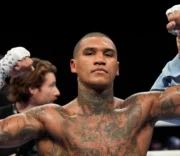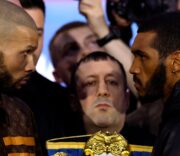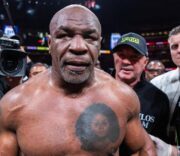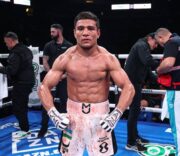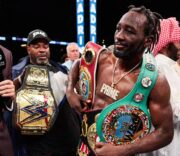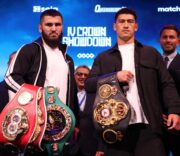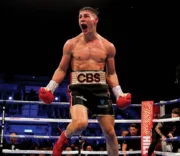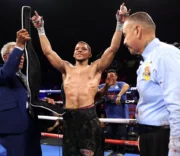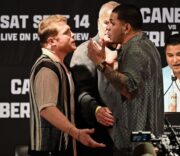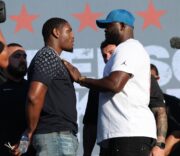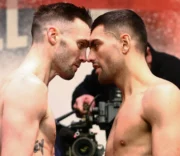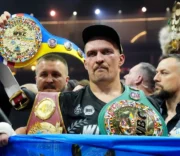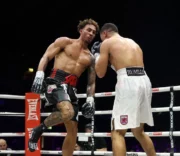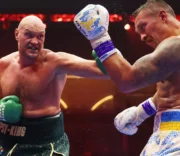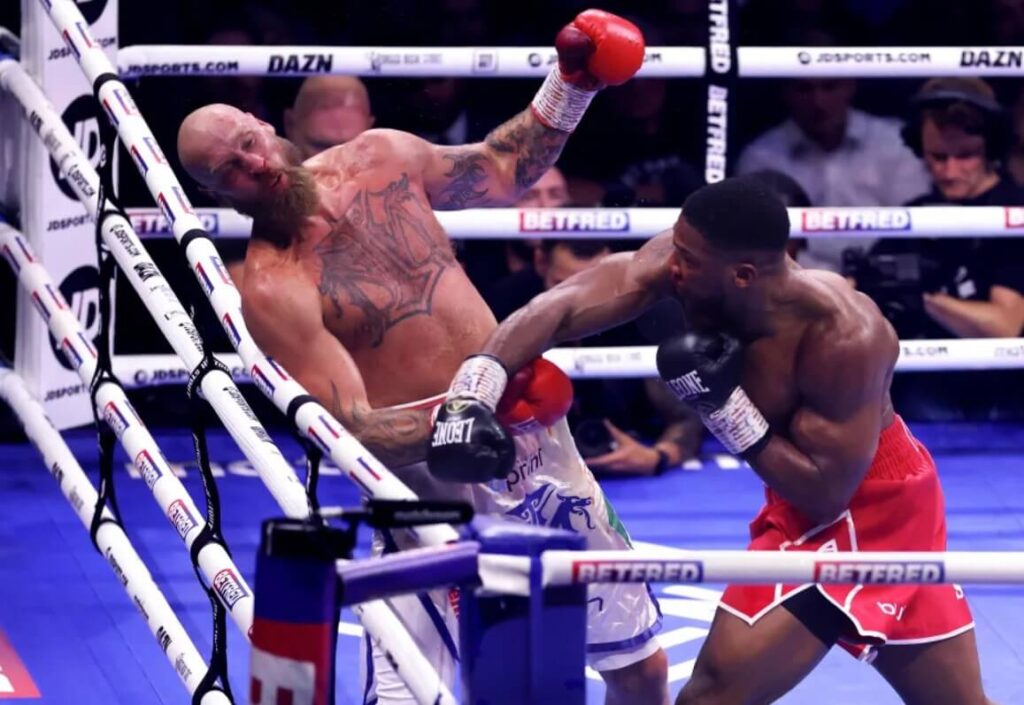
Boxing has its moments that remain etched in the memories of enthusiasts, and Anthony Joshua’s recent triumph over Robert Helenius will undoubtedly join those ranks. The O2 Arena on a Saturday night became the epicenter of pulsating excitement as the British heavyweight showcased a blend of patience, strategy, and raw power.
A Glance at the Night’s Big Moments
- Round-by-Round Analysis:
- Initial Hesitation: The early rounds saw Joshua taking a careful approach, with both fighters appearing reluctant to fully engage.
- Middle Rounds: Joshua’s power punches began to land with more frequency, indicating a growing confidence.
- The Final Blow: A swift, clean right hand in the seventh sealed Helenius’ fate.
- Behind-the-Scenes Drama: Helenius’ chance to square off against Joshua materialized unexpectedly, following revelations of Dillian Whyte’s failed drug test.
- Ring-Walk Highlights: Both fighters made their presence felt even before the fight began. Helenius, christened the ‘Nordic Nightmare’, exuded confidence during his entry, while Joshua’s arrival was accompanied by iconic tunes.
Delving into the Early Rounds
Boxing aficionados often look for patterns, signs that hint at a fighter’s strategy or mindset. The initial rounds of this bout were marked by caution, with neither boxer willing to risk early errors.
Joshua’s restraint was evident, but there were glimpses of his prowess. A few jabs were thrown, but neither seemed keen on making the first big move.
“People need to let me breathe a bit and do what I do,” – Anthony Joshua.
In the third and fourth rounds, Joshua’s intent became clearer. His right hand landed with increasing precision, suggesting a shift in strategy.
The Power Punch and What It Signifies
In a sport where a single punch can alter the trajectory of a career, Joshua’s knockout in the seventh round was a thing of beauty. Helenius was strategically positioned against the ropes, a perfect setup for the final act. With a feint and a swift looping right, Joshua executed a punch that ended the bout.
This wasn’t just about the knockout; it was a testament to Joshua’s evolution as a boxer. The world was reminded of his lethal capabilities, but also introduced to a more mature, calculated fighter.
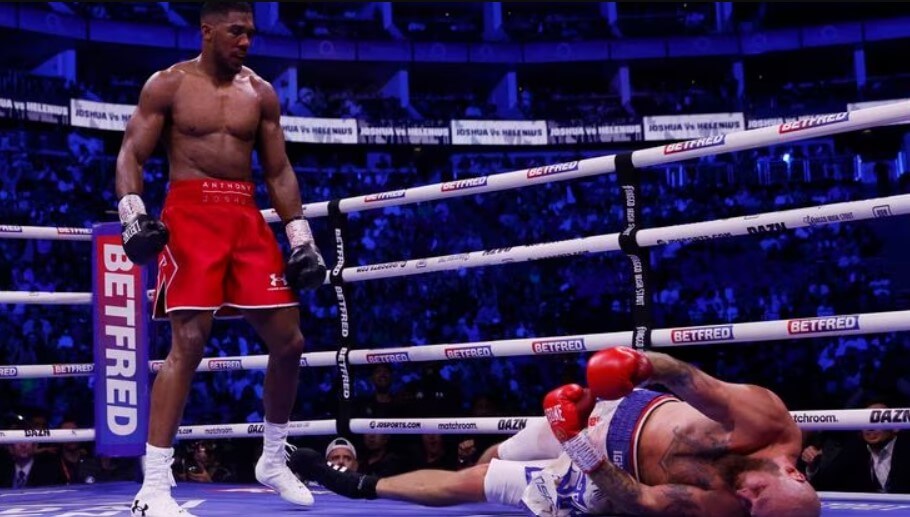
The Undercard: Chisora vs. Washington
While the limelight was on Joshua, there was no dearth of action elsewhere. In a clash between two experienced fighters, Derek Chisora faced off against Gerald Washington in a bout that spanned 10 rounds. It was a slow, methodical contest.
| Fighter Stats | Derek Chisora | Gerald Washington |
| Age | 39 | 41 |
| Recent Performance | Mixed | No win since 2019 |
| Fight Outcome | Decision Win | Lost |
Chisora, showing signs of age, was not at his peak. He was cut early, and despite pushing forward, lacked the precision of his younger days. Washington, too, seemed weary as the rounds progressed, making it a somewhat lackluster affair.
Noteworthy Mentions
Filip Hrgovic faced Dempsey McKean in a bout that saw the former struggling for 11 rounds. However, the 12th round witnessed a turn of events with a decisive right hand from Hrgovic sealing the deal.
In another exciting match, Johnny Fisher claimed the Southern Area heavyweight title, overpowering Harry Armstrong in the final round.
The Hitman Analogy: Joshua and The Godfather
The O2 Arena was filled with the intense theme from The Godfather, setting the mood for what was to be a fight paralleled to a mafia hit. The unexpected knockout, much like a mobster’s surprise hit, came swiftly and brutally.
The nature of the match, with Helenius having been brought in on short notice and having suffered losses before, made the knockout by Joshua seem almost inevitable. However, despite this predictability, Joshua remained patient and strategic.
A Manufactured Emotion
There was a palpable sense that Joshua had to deliberately create a connection, even if it was antagonistic, with Helenius. Stripped of the genuine emotion that was present in his original fight against Dillian Whyte, Joshua’s encounter with Helenius seemed more of a task. It was an assignment to be dealt with precision and detachment.
To bolster this created connection, Joshua tried to ruffle Helenius during the weigh-in. Though these attempts to play the “bad boy” role were somewhat forced, it helped inject some emotion into the bout.
The Deceptive Calm
In the early rounds, Helenius might have felt secure, perhaps even believing Joshua might go easy on him. But like an expert hitman, Joshua lulled his target into a false sense of security before springing his lethal surprise.
Helenius’s initial confidence grew as he managed to out-jab Joshua in the initial rounds, which hinted at a bit of stiffness in Joshua’s approach. But as rounds progressed, Joshua’s strategy became clear. His timely right hand punches, especially in the second and third rounds, became precursors to the final knockout.
“He’s leaning back,” Joshua was heard commenting to his coach Derrick James, indicating slight unease.
The Climax: More than Just a Knockout
Given the circumstances leading up to the fight, Joshua needed more than a mere win. A messy stoppage wouldn’t suffice. He needed a clear, commanding victory, and he got it with a well-executed left jab and a right cross.
The relief following the knockout was palpable. Joshua’s celebrations were more suited for a win against bigwigs like Fury, Usyk, or Wilder. Surprisingly, he exited the ring momentarily to celebrate with fans before reentering to jest about “carrying the heavyweight division”, referring to a bad back.
Behind the Scenes: Joshua’s Personal Battle
Beyond the physical fight, Joshua seemed to be battling internal pressures. The Dillian Whyte saga, the replacement match with Helenius, all weighed on him. Much like a hitman conflicted with his emotions, Joshua seemed to be grappling with doubts, only finding solace once the trigger was pulled.
In the end, while the match itself might not have been the most defining moment of his career, it provided a deep dive into Joshua’s psyche, shedding light on the man behind the gloves.


